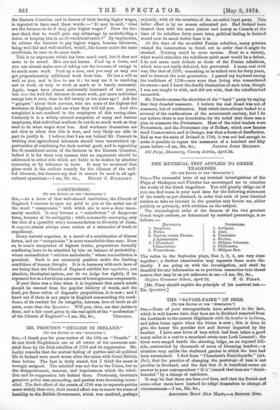COMPROMISE.
[TO THE EDITOR OF THE "SPECTATOR:]
SIR,—As a lover of that well-abused institution, the Church of England, I venture to open my grief to you at the unfair use of the word " compromise " with which she is now-a-days inces- santly assailed. It may become a " maledietum " of dangerous force, because of its ambiguity ; while necessarily conveying only the idea of a (possibly wise) accommodation to diversity of claim, it suggests almost always sonic notion of a surrender of truth to expediency.
Every natural organism is a result of a combination of diverse forces, and no " compromise " is more remarkable than man. Even so, in man's acceptance of highest truths, propositions formally conflicting have to be admitted by him on balance of probability, whose contradiction " solvitur ambulando," whose reconciliation is practical. Such is our creaturely position under the limiting conditions of human thought. It is in harmony with such laws of our being that the Church of England exhibits her regulative, not absolute, theological system, nor do we judge her rightly, if we represent her as a fortuitous concourse of heterogeneous components.
If ever there was a tiMe when it is important that men's minds should be rescued from the popular idolatry of words, and the fond, yet fierce cultus of dogmatic propositions, it is now ; and I know not if there is any paper in England commanding the confi- dence of its readers for its integrity, fairness, love of truth at all coats, more than the Spectator. Will you, then, see that justice is done, and a fair court given to the real spirit of the "moderation"
of the Church of England?—I am, Sir, &c., THEOROS.


































 Previous page
Previous page